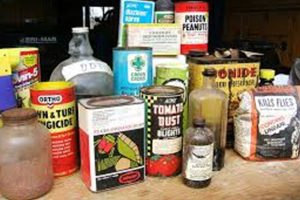
Link Between Cancer And Household Pesticides. An emerging study has found a link between pediatric cancer and household pesticides. Researchers at the Georgetown Lombardi Comprehensive Cancer Center have found that the urine of children with a specific type of cancer contains increased levels of common household pesticides, said ScienceDaily. The research discovered the finding occurred […]

Link Between Cancer And Household Pesticides. An emerging study has found a link between pediatric cancer and household pesticides. Researchers at the Georgetown Lombardi Comprehensive Cancer Center have found that the urine of children with a specific type of cancer contains increased levels of common household pesticides, said ScienceDaily.
The research discovered the finding occurred in children with acute lymphoblastic leukemia (ALL), a cancer that generally develops when children are between three and seven years of age, said ScienceDaily. The study’s findings appear in next month’s issue of the journal Therapeutic Drug Monitoring.
The study took place from January 2005 to January 2008 with volunteers who live in the Washington metropolitan area and are from Lombardi and Children’s National Medical Center, said ScienceDaily. The study was comprised of 41 pairs of children diagnosed with ALL and their mothers, which made up the Case group; the Control group consisted of 41 pairs of healthy children and their mothers. The two groups were matched by age, sex, and county of residence, reported Science Daily.
Researchers collected urine samples from all the pairs, which were analyzed by the U.S. Centers for Disease Control and Prevention (CDC) for the presence of organophosphates (OP), said Science Daily. OP is, said ScienceDaily, the chemical name of some household pesticides.
While prior research in that area has pointed to links between pesticides and childhood cancers, this study is the first of its kind to be conducted in a large, metropolitan area.
“In our study, we compared urine samples from children with ALL and their mothers with healthy children and their moms. We found elevated levels of common household pesticides more often in the mother-child pairs affected by cancer,” said study lead investigator, Offie Soldin, PhD, an epidemiologist at Lombardi, quoted ScienceDaily. “We shouldn’t assume that pesticides caused these cancers, but our findings certainly support the need for more robust research in this area,” Soldin added.
The research revealed that two common OPs—diethylthiophosphate (DETP) and diethyldithiophosphate (DEDTP)—tested higher in pediatric ALL patients versus children in the control group, said Science Daily. Also, said Science Daily, there was a higher incidence of Case mothers—33 percent—over Control mothers—14 percent—who reported household pesticide use.
“What this study suggests is an association between pesticide exposure and the development of childhood ALL, but this isn’t a cause-and-effect finding,” Soldin said, quoted Science Daily. “Future research would help us understand the exact role of pesticides in the development of cancer. We hypothesize that pre-natal exposure coupled with genetic susceptibility or an additional environmental insult after birth could be to blame,” he added.
Earlier this year we wrote about links between pesticides and Parkinson’s disease. Earlier this month we wrote that researchers said that pesticide exposure might also be linked to an increase in Alzheimer’s disease risks.
Reuters also previously reported that the results of a study of 319 Parkinson’s patients and 200 non Parkinson’s-affected relatives found that people diagnosed with Parkinson’s are more than two times likelier to report pesticide exposure over people not diagnosed with the disease.
The personal injury attorneys at Parker Waichman LLP offer free, no-obligation case evaluations. For more information, fill out our online contact form or call 1-800-YOURLAWYER (1-800-968-7529).


